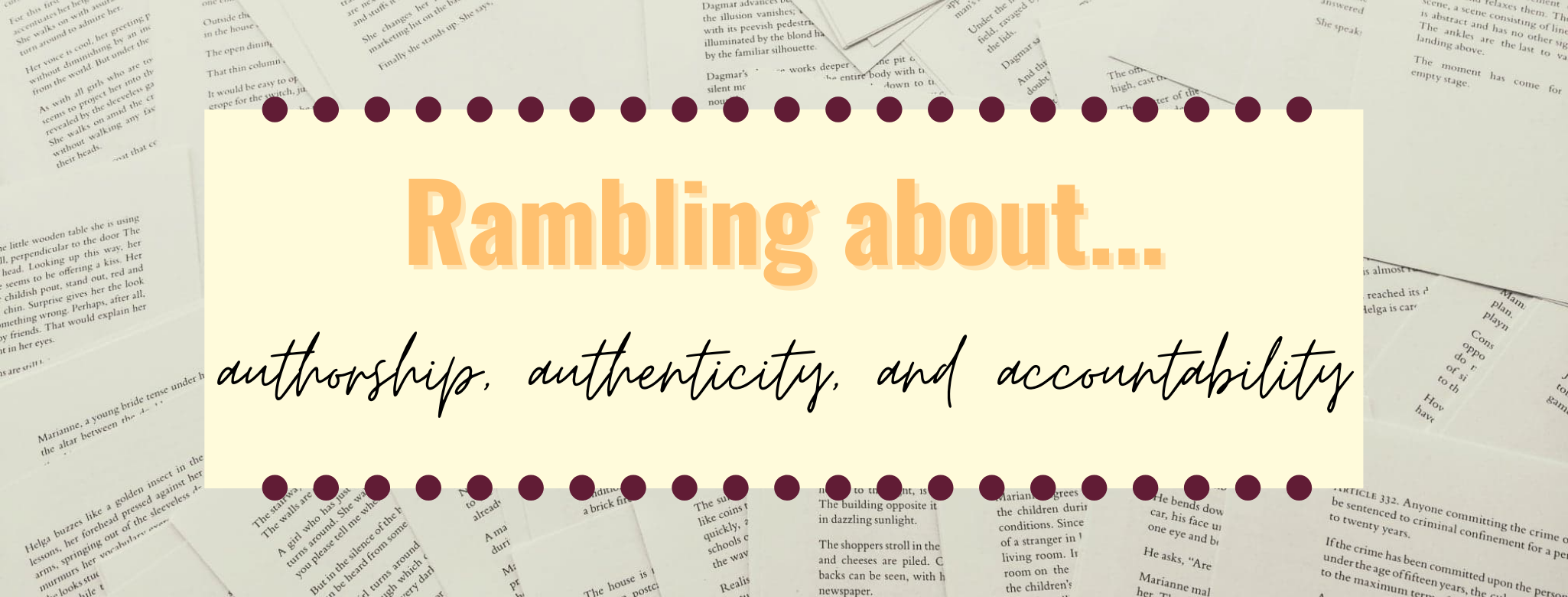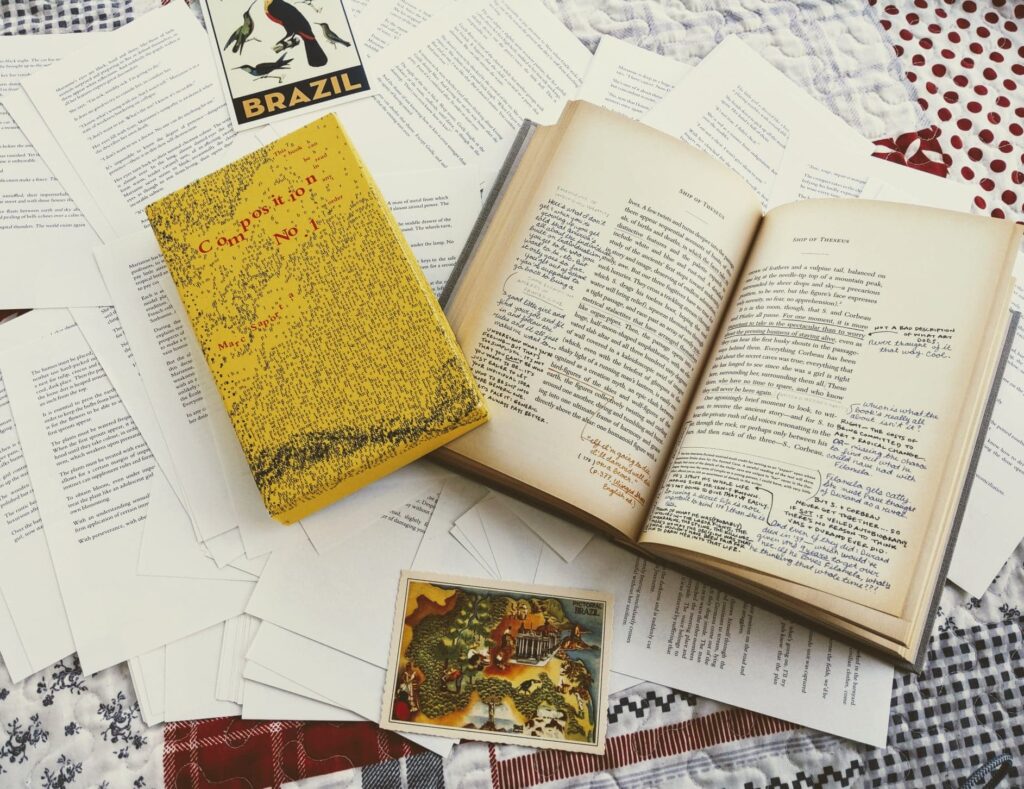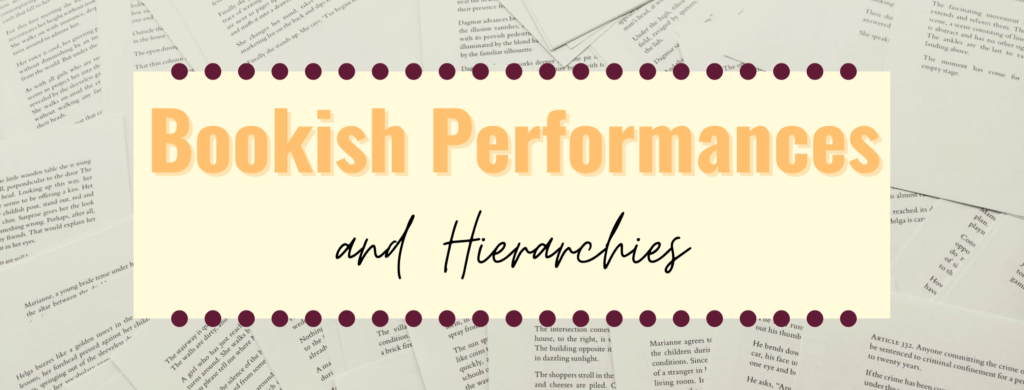Hello! I apologise that it’s been a while – life stuff, you know? – but I’m back now and feeling the ever increasing panic that I want to release Shifting Sands next month. How do I keep losing such big pockets of time?! (The answer is clearly that it’s 2020)
Aaaaanyway, last week I attended my first online conference and, I have to admit, it worked surprisingly well for me. I had a huge energy crash around Wednesday (busy month) so couldn’t make it to many panels, but I can still catch up this week because everything was recorded. Yay! I presented a paper loosely acting as a pilot study for research I intend to do, looking at author authenticity versus accountability. This question then echoed through in the panel discussion, as we started to discuss the Twitter-related actions of a certain author, and so I’ve tried to track some of my thoughts here. Welcome to another ramble, this time discussing online identities, author responsibility, and personal inconsistencies.
So, for those who don’t obsessively live their lives on Book Twitter, here’s a brief overview of all that was going on with one particular author that led to a discussion about author responsibility versus personal truth. I will not name the author in question, since apparently she likes to threaten small presses who write about her anti-trans views with legal action and I have no money. Let’s call her… RKJ. RKJ is a very famous author. Like, millions of followers on Twitter, lots of kids looking up to her kind of famous. And, for a good portion of her fame, she was seen as this benevolent mother goddess, looking after her fandom from a distance. When she first arrived on Twitter, she’d tweet supportive tweets to her fans, protectively shut down those who could cause her fandom harm, but still gave this air of inclusion and love. Yeah, she sometimes tweeted things that interfered with the books and that could be annoying, but she was otherwise harmless (or so it seemed). Then she started liking tweets that were rather anti-trans. A slip of the finger, you know? A senile moment. Not her fault. No, never her fault. Until it kept happening. She edged further and further, liking and tweeting things that were decidedly anti-trans, until finally she published what was basically an anti-trans manifesto arguing that her anti-trans fears were legitimate (since said fears were echoed in her recent book, part of me wonders if this wasn’t some backwards version of marketing, but that’s a whole other blog post). Think of the children! But apparently she wasn’t thinking of the children who, drawn to her page by her posting about the children’s drawings for her latest project, would see her vitriol muddled in between tweets directly addressing her youngest audience.
There’s a lot of demand for authors to reveal their true selves online. Reader want a connection, to feel like they belong not only in the storyworld, but also in the author’s world too. They want to be part of that community, to feel included. But can an online self be “true”? And should they even try to be? The person coordinating my panel at the conference brought up the idea of digiphrenia, which talks about managing multiple online identities. I know for myself, this is something I struggle with – no matter how true to myself I try to be, I know that the version of me on my author Twitter is slightly different than my personal on, my Facebook self is different from my blog self, and so on. It’s a version of “true” me, but a carefully curated one. A big part of that curation comes from the personal responsibility I feel.
No matter how hard I try, I am endlessly aware that this is a research project. I love Shifting Sands, I love what I’m doing, but it’s a research project. It must be well-considered, done purposefully, and, most relevantly here, I have to think of the ethical side of my public performance. I don’t want to cause harm. And I don’t want to disrupt the results I may get by accidentally causing a scandal. The result of this is that I carefully consider each tweet I post. As I found in my brief analysis of three authors I looked at for my conference paper, there’s a degree of truth in my online self, but it is carefully curated to try and appeal to my imagined audience. More of the “real” me probably comes out through the tweets I like. Interaction reveals the self. But then maybe that’s because interaction gives you more control over the audience of the tweet?
Social media is a public space. You don’t always know who you’re writing to. For me, I’m pretty positive that the majority of my audience is made up of adults and, on Twitter at least, most of them are either academics or other writers. These are the communities I fit into naturally (whether this will bring me readers once I publish is a different question). While I am very careful with my posts anyway, the fact that adults are my target audience brings me comfort. Adults have the ability to read a variety of views, deciding for themselves what they agree with and what they don’t. Someone can say horrible things to/about them and, while it may hurt, they can decide that that person’s views don’t matter anymore. Children don’t always have that ability. I think that’s one of my biggest issues with KJR’s behaviour. I personally don’t like her views but, if her audience was 99% adults, I’m not sure I’d feel as strongly. As an author, you have a responsibility to your readers. You want them to trust you, as the creator of this shared story space. I don’t think KJR is behaving responsibly. When you tweet your damaging opinions to the world as a public figure with zero empathy, that’s a problem. She’s lost sight of who her audience is and I wonder if that’s part of the problem. After the big children’s series that catapulted her into global fame, she tried writing for adults. It’s where she really wanted to be, after all. But she never landed the same level of success there, not really until she revealed herself as the author behind the pseudonym. Sometimes I wonder if that was the turning point of it all, the moment where some of her bitterness towards the fandom was solidified (but again, that’s a whole other blog post).
As noted above, KJR used to be seen as this benevolent mother figure. She seemed open, accepting everyone who needed a place in her storyworld, reminding us that we all belong there. Yes, there were some issues with the fact that this inclusivity wasn’t quite as prominent in the books, but everyone had a place in the wider storyworld, right? Right?! Her online behaviour has chipped away that illusion, revealing the wolf underneath. And it feels like a betrayal. I think that’s probably why so many of her older fans – the ones who have grown up with her as this beloved fandom mother – are so angry. The mask has come off and it’s showing that the storyworld isn’t for everyone. It’s not the home she promised. The flip feels jarring because it doesn’t match up with the way she was previously perceived, even if this version of herself we now see could in fact be the same one that’s been there all along.
This becomes even more complicated when you put it in the context of a shifting society. I’ve talked before about being torn between this need to create a stable author brand and the fact everything is changeable. I’m growing as I keep doing this project. The way I interpret it now could be totally different by the time I finish. Society is the same. The language we use, the way we share our thoughts and opinions, even the way we write our stories, changes with time. Just looking at authors, our expectations for them have shifted a lot in the past decade or so. We want them to be online, interacting with us, being part of our community. This means we constantly have to adjust to these societal shifts, changing our practices to meet our audience in new ways. I love the fact that I’ve got some authors on my Twitter feed that are so much fun to interact with. They feel so much more real as they rant about rabbits, writing, and political rights. But, there’s a cost to this. The moment you add a living, breathing person into the mix, you lose some of the stability. A single woman writing in her early twenties might see things very differently to a married woman with two kids approaching forty. Their needs change, the community around them changes, and so their views do too, but this may seem to contradict the earlier version of themselves. How do authors navigate their growth as a person when social media acts as an archive of their every thought? We all know that fans love to pick apart inconsistencies and, with the author now so tied to the text through their online engagement, these personal contradictions offer more opportunities for dissection. In a way, the author becomes trapped, needing to show growth that keeps up with their true self and a changing society, but also needing to stay the same to maintain the same author brand identity.
While I certainly don’t agree with KJR’s online behaviour, she does make an interesting case study as someone who has shifted from beloved author who seemed to have her finger on the cultural button to someone who’s views feel outdated, harmful, and antithetical to the story she created. It raises a lot of questions about truth and how public figures navigate it, whether it is better to curate your social media content to be fully “true” to who you are at that moment, or to try and create a timeless curated version of the self to better navigate the audience you have now and the audience you may have in future. I’m still exploring these thoughts, but I’d love to hear from all of you. Are you your true self online?




Do we really need to believe in the author? Many authors are cads; crooks; adulterers; opinionated and uncouth but does that necessarily reflect on their ability to write a story. Do we need to know their personal lives, their opinions and/or their identity to enjoy their book? Personally, I am not so sure.
If RKJ wants to go on and discuss her thoughts on any subject, doe that make her books unreadable? The young teens are not going to know about her opinion on trans. They are going to enjoy her books much the same way that the original generation did.
Why do her, now “grown-up”, fans want to besmirch her now? You may not agree with her views but that does not give the social media trolls the right to destroy her “author’s identity”. Just because they can, I am no fan of social media, does not mean that they should.